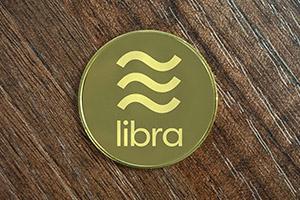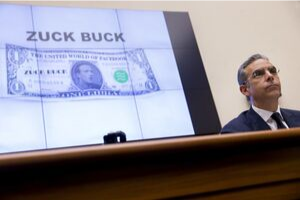Business
Facebook’s Libra: Cure for the Common Cryptocurrency?

Facebook made waves in the crypto community with its recent announcement of Libra, a new digital currency the company hopes consumers will use in their daily transactions by the end of 2020.[1] Congress and regulators are already skeptical, however, leaving Facebook and its partners in the Libra Association with an uphill battle as they seek to appease policymakers while developing and deploying a token of unprecedented scale.[2] This article provides a brief practical perspective on Libra’s blockchain-tied benefits, and the potential to build trust in global transaction economies.
The Problem: Centralized Authority and Friction in Global Transaction Economies
To facilitate international transactions, financial institutions provide an array of services (e.g., insurance) to bridge trust between geographically distant partners, a necessary process given parties entering overseas agreements have limited means to verify the integrity of their foreign counterparties.[3] Institutions like Western Union provide these services and are assumed to be trustworthy, leaving those in global transaction economies with few alternatives to mitigate their risk. With unilateral authority over the processes that effectuate international transactions’ legitimacy, these third-party intermediaries charge high fees for their services and erase, on average, seven percent of a transaction’s value.[4]
 The Libra Blockchain’s Solutions:
The Libra Blockchain’s Solutions:
Standardization
The Libra Association aspires to develop: (1) a global currency (one unit of the currency is called a “Libra”); and (2) a standardized financial infrastructure transcending national boundaries (the “Libra Blockchain”).[5] In theory, this means people anywhere in the world could use their mobile devices to send money or buy goods with the Libra currency, just like sending a text message or photo. Specifically, users would manage “Libras” through Calibra, a digital wallet that would be accessible through popular social media applications, such as WhatsApp and Instagram.[6] To distance the Libra currency from volatility concerns associated with other cryptocurrencies, it is being developed as a “stablecoin,” a digital asset with intrinsic value that is backed by a reserve of real-world assets (a pool of “safe” securities).[7]
Distributed Governance
Utilizing an encrypted distributed ledger, the Libra Blockchain is the system through which the Libra currency will be exchanged.[8] While much of the reporting on Libra focuses on Facebook’s involvement, it is important to note that Facebook will share control over the currency with its partners in the Libra Association, including Mastercard, Visa, PayPal, Stripe, eBay, Lyft, Spotify, and Uber. By agreeing to a pre-established framework of rules governing all transactions, these companies will each have a voice in how the system will be managed, so “no single entity has control over the ecosystem or can unilaterally shape its evolution to its advantage.”[9] Under this distributed governance model, each company will pay a $10 million buy-in fee to become a member of the association and will secure its position as a node on the Libra Blockchain.[10]
Immutable, Trackable, and Traceable
As nodes, these companies will take turns verifying the legitimacy of transactions entered into the Libra Blockchain. For bad actors who have enjoyed the anonymity provided by Bitcoin, this permissioned node verification system aims to reduce fraud because a distributed ledger is also immutable.[11] Because all transactions will be recorded on a single self-correcting data structure, users can also easily verify the legitimacy of their partners, and will no longer need to retain the services of third parties, like Western Union, to reduce their risk.[12] In addition, by being able to trace the entire history of a user’s activity on the Libra Blockchain, parties entering international transactions can gain visibility into potential partners’ creditworthiness and overall legitimacy, ensuring payment or automatic reconciliation in the event of nonperformance. Notwithstanding privacy concerns, perfect implementation envisions a fluid transnational marketplace with better informed buyers and sellers.
Takeaways:
Given the proliferation of smartphones and cheap data plans, Libra’s potential benefits cannot be understated.[13] For people who remain without access to even the most basic retail banking services in emerging markets, Libra could provide a universally accepted medium of payment, and provide the building blocks for a streamlined network of financial services. Parties entering international transactions would no longer have to place their faith in third-party intermediaries while netting a larger percentage of their labor. In sum, geographically distant partners could directly exchange value on the Libra Blockchain, which will purportedly enable users to track and trace every transaction that occurs on its encrypted distributed ledger.
What’s Next?
Despite the inevitable regulatory headwinds, Libra stands to reduce friction in global transaction economies, financially empowering those at the “fringe of the existing financial system” with a standardized (i.e., trustworthy) system for facilitating international transactions.[14] Be on the lookout for my next piece covering “stablecoins” and looming regulatory barriers for the Libra Association.
[1] Dale, B. (2019, June 18). Libra Whitepaper Shows How Facebook Borrowed From Bitcoin and Ethereum Coindesk. Retrieved from https://www.coindesk.com/libra-white-paper-shows-how-facebook-borrowed-from-bitcoin-and-ethereum.
[2] United States. Cong. House. Financial Services Committee. (2019, July 17). Examining Faccebook’s Proposed Cryptocurrency and Its Impact on Consumers, Investors, and the American Financial System. Hearings, July 17, 2019. 116th Cong. 1st sess. Washington: https://financialservices.house.gov/uploadedfiles/hhrg-116-ba00-wstate-genslerg-20190717.pdf.
[3] Hrnjic, E., & Tomczak, N. (2019, July 25). Decentralised Finance In A Centralised World. The Business Times. Retrieved from https://www.businesstimes.com.sg/opinion/decentralised-finance-in-a-centralised-world.
[4] The World Bank. (2019, June 1). Remittance Prices Worldwide: an analysis of trends in cost of remittance services. Retrieved from https://remittanceprices.worldbank.org/sites/default/files/rpw_report_june_2019.pdf.
[5] The Libra Association. (2019, June 18). Libra Whitepaper. Retrieved from https://libra.org/en-US/white-paper/
[6] Baraniuk, C. (2019, August 13). Libra: Could Facebook’s new currency be stopped in its tracks? BBC News. Retrieved from https://www.bbc.com/news/business-49090753.
[7] Hayes, A. (2019, August 9). Stablecoin. Investopedia: Cryptocurrency Strategy & Education Retrieved from https://www.investopedia.com/terms/s/stablecoin.asp
[8] The Libra Association. (2019, June 18). The Libra Blockchain. Technical Whitepaper Retrieved from https://developers.libra.org/docs/assets/papers/the-libra-blockchain.pdf.
[9] Id.
[10] Constine, J. (2019, June 20). Facebook Announces Libra Cryptocurrency. TechCrunch. Retrieved from https://techcrunch.com/2019/06/18/facebook-libra/.
[11] Marvin, R. (2019, July 15). Crypto Comparison: Why Bitcoin and Libra Are Vastly Different. PCMag.com. Retrieved from https://www.pcmag.com/news/369418/crypto-comparison-why-bitcoin-and-libra-are-vastly-differen.
[12] Bosamia, M. (2018, August 1). Current Trends and Future Implementation Possibilities of the Merkel Tree. International Journal of Computer Sciences & Engineering. Retrieved from: https://www.researchgate.net/publication/327601654_Current_Trends_and_Future_Implementation_Possibilities_of_the_Merkel_Tree.
[13] McKinsey. (2018, October 1). Global Payments 2018: A Dynamic Industry Continues to Break New Ground. Retrieved from
https://www.mckinsey.com/~/media/McKinsey/Industries/Financial%20Services/Our%20Insights/Global%20payments%20Expansive%20growth%20targeted%20opportunities/Global-payments-map-2018.ashx.
[14] Clozel, L., & Michaels, D. (2019, July 13). SEC Weighs Whether to Regulate Facebook’s Libra. The Wall Street Journal. Retrieved from https://www.wsj.com/articles/sec-weighs-whether-to-regulate-facebooks-libra-11563015601.
